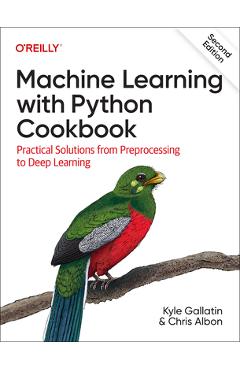From Deep Learning to Rational Machines: What the History of Philosophy Can Teach Us about the Future of Artificial Intelligence - Cameron J. Buckner

Detalii From Deep Learning to Rational
libris.ro
274.86 Lei
343.58 Lei
Philosophy
Cameron J. Buckner
From Deep Learning to Rational - Disponibil la libris.ro
Pe YEO găsești From Deep Learning to Rational de la Cameron J. Buckner, în categoria Philosophy.
Indiferent de nevoile tale, From Deep Learning to Rational Machines: What the History of Philosophy Can Teach Us about the Future of Artificial Intelligence - Cameron J. Buckner din categoria Philosophy îți poate aduce un echilibru perfect între calitate și preț, cu avantaje practice și moderne.
Preț: 274.86 Lei
Caracteristicile produsului From Deep Learning to Rational
- Brand: Cameron J. Buckner
- Categoria: Philosophy
- Magazin: libris.ro
- Ultima actualizare: 25-10-2024 01:12:27
Comandă From Deep Learning to Rational Online, Simplu și Rapid
Prin intermediul platformei YEO, poți comanda From Deep Learning to Rational de la libris.ro rapid și în siguranță. Bucură-te de o experiență de cumpărături online optimizată și descoperă cele mai bune oferte actualizate constant.
Descriere magazin:
This book provides a framework for thinking about foundational philosophical questions surrounding the use of deep artificial neural networks (deep learning) to achieve artificial intelligence. Specifically, it links recent breakthroughs to classic works in empiricist philosophy of mind. In recent assessments of deep learning\'s potential, scientists have cited historical figures from the philosophical debate between nativism and empiricism, which concerns the origins of abstract knowledge. These empiricists were faculty psychologists; that is, they argued that the extraction of abstract knowledge from experience involves the active engagement of psychological faculties such as perception, memory, imagination, attention, and empathy. This book explains how recent deep learning breakthroughs realized some of the most ambitious ideas about these faculties from philosophers such as Aristotle, Ibn Sina (Avicenna), John Locke, David Hume, William James, and Sophie de Grouchy. It illustrates the utility of this interdisciplinary connection by showing how it can provide benefits to both philosophy and computer science: computer scientists can continue to mine the history of philosophy for ideas and aspirational targets to hit, and philosophers can see how some of the historical empiricists\' most ambitious speculations can now be realized in specific computational systems.

Produse asemănătoare

Machine Learning with Python Cookbook: Practical Solutions from Preprocessing to Deep Learning - Kyle Gallatin
![]() libris.ro
libris.ro
Actualizat in 26/03/2025
446.35 Lei

Programming Machine Learning: From Zero to Deep Learning, Paperback/Paolo Perrotta
![]() elefant.ro
elefant.ro
Actualizat in 04/03/2025
235.99 Lei
